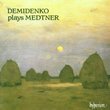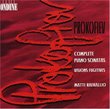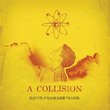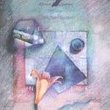| All Artists: Daniel Nazareth Title: RESPIGHI: Sinfonia Drammatica Members Wishing: 0 Total Copies: 0 Label: Marco-Polo Release Date: 8/4/2009 Genre: Classical Styles: Historical Periods, Modern, 20th, & 21st Century, Symphonies Number of Discs: 1 SwapaCD Credits: 1 UPCs: 4891030204188, 730099241823, 489103020418 |
Search - Daniel Nazareth :: RESPIGHI: Sinfonia Drammatica
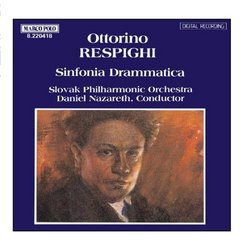 | Daniel Nazareth RESPIGHI: Sinfonia Drammatica Genre: Classical
RESPIGHI: Sinfonia Drammatica by Daniel Nazareth |
Larger Image |
CD DetailsSynopsis
Album Description RESPIGHI: Sinfonia Drammatica by Daniel Nazareth Similar CDsSimilarly Requested CDs
|
CD ReviewsA 'new' aspect of Respighi K. Farrington | Missegre, France | 03/14/2000 (3 out of 5 stars) "I first came across Respighi in my mid-teens and quickly went through all the recorded works including his smaller pieces. I have not heard anything different by him for years and this welcome CD is certainly more than a mere curiosity. The work was completed in 1914 and may be thought of by some as an hours hunk of pseudo-Straussian orchestral tirade. These 'generic' works are now readily available, for example, I have Szymanowski's first two symphonies and Josef Suk's Asrael Symphony and his tone poem Ripening, which at one time were unavailable. Because it is frequently argued that these works are not reflective of the 'true artist' because they were written when the composer 'was under the Strauss influence' they are sometimes dismissed. While it is true that they use an opulent orchestra which was first used by Richard Strauss, they can be unique works that provide the listener with sounds that are not present in Strauss or anywhere else. I believe this is a mistake and has probably got more to do with their expense and playing difficulty than their artistic merit. This work is early by Respighi's tone poems' standard, although it was penned when he was thirty five years old. The first movement, an Allegro energico is certainly true to its name with its dynamics and has a blazing chorale with overtones of the second movement of 'Pines' when the blazing trumpets escort the Roman legions down the Appian Way in triumph. This music is not Straussian, it is pure Respighi, a first rate musician in his own right. The haunting melody (yes, what effrontery? A melody?) of the second movement deserves to be well known. Its chromatic character may owe something to Tristan but the musical journey it undertakes during its seventeen minutes is Latin in its intensity of feeling and its harmonic world is shared with Debussy, particularly in 'Images'. Yet the brass chorale and climax seem almost Russian, maybe Rachmaninov in his Symphony Number 1. These vatious disparate factors come together and provide us with something totally new which I have not heard elsewhere (how ungeneric can you get?). The most unsatisfactory movement for me is the finale, an Allegro impetuoso, which impressive though it is in terms of inventive orchestration and musical argument, lacks some degree of authenticity, redolent of the finale of Walton's splendid Symphony No 1. It makes huge demands on the conductor to prevent it all falling apart (like Strauss' 'Till Eulenspiegel' and 'Also sprach Zarathustra) and the final product lacks conviction on this recording. The emergence of a quasi-motto theme does a little to pull things together but ultimately the end feeling is of a bombastic work which does not have enough heart. It is a shame that the end effect of the work leaves this taste in the mouth. The playing here contains some audible errors, particularly in the first and last movements. The recording sounds as if they placed the microphones too far way to 'get everybody in'. It sounds a little like those old Melodiya vinyls with which you sometimes could hear the sound echoing off the walls of the auditorium. Every now and again I check the label to see if I have not made a mistake and put an old 'Russky' on the turntable by mistake. If this was well recorded this work might have more authenticity and hold itself together better. However, for me, the CD is worth it for the second movement alone. I have not heard the Downes alternative so I cannot judge by comparison." Cheaper on naxos robert kilbride | ft. lauderdale, FL USA | 11/05/2000 (4 out of 5 stars) "This exact same performance is now available on Naxos (which owns Marco Polo) for $5.97 at Amazon.com. Save the 7+ dollars! It is a very enjoyable cd, powerful Respighi!"
|

 Track Listings (3) - Disc #1
Track Listings (3) - Disc #1